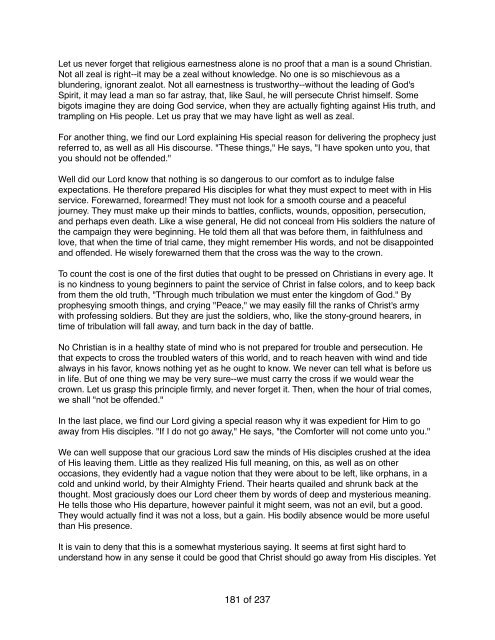J. C. Ryle John
John Charles Ryle (May 10, 1816 - June 10, 1900) was an evangelical Anglican clergyman and first Bishop of Liverpool. He was renowned for his powerful preaching and extensive tracts.
John Charles Ryle (May 10, 1816 - June 10, 1900) was an evangelical Anglican clergyman and first Bishop of Liverpool. He was renowned for his powerful preaching and extensive tracts.
You also want an ePaper? Increase the reach of your titles
YUMPU automatically turns print PDFs into web optimized ePapers that Google loves.
Let us never forget that religious earnestness alone is no proof that a man is a sound Christian.<br />
Not all zeal is right--it may be a zeal without knowledge. No one is so mischievous as a<br />
blundering, ignorant zealot. Not all earnestness is trustworthy--without the leading of God's<br />
Spirit, it may lead a man so far astray, that, like Saul, he will persecute Christ himself. Some<br />
bigots imagine they are doing God service, when they are actually fighting against His truth, and<br />
trampling on His people. Let us pray that we may have light as well as zeal.<br />
For another thing, we find our Lord explaining His special reason for delivering the prophecy just<br />
referred to, as well as all His discourse. "These things," He says, "I have spoken unto you, that<br />
you should not be offended."<br />
Well did our Lord know that nothing is so dangerous to our comfort as to indulge false<br />
expectations. He therefore prepared His disciples for what they must expect to meet with in His<br />
service. Forewarned, forearmed! They must not look for a smooth course and a peaceful<br />
journey. They must make up their minds to battles, conflicts, wounds, opposition, persecution,<br />
and perhaps even death. Like a wise general, He did not conceal from His soldiers the nature of<br />
the campaign they were beginning. He told them all that was before them, in faithfulness and<br />
love, that when the time of trial came, they might remember His words, and not be disappointed<br />
and offended. He wisely forewarned them that the cross was the way to the crown.<br />
To count the cost is one of the first duties that ought to be pressed on Christians in every age. It<br />
is no kindness to young beginners to paint the service of Christ in false colors, and to keep back<br />
from them the old truth, "Through much tribulation we must enter the kingdom of God." By<br />
prophesying smooth things, and crying "Peace," we may easily fill the ranks of Christ's army<br />
with professing soldiers. But they are just the soldiers, who, like the stony-ground hearers, in<br />
time of tribulation will fall away, and turn back in the day of battle.<br />
No Christian is in a healthy state of mind who is not prepared for trouble and persecution. He<br />
that expects to cross the troubled waters of this world, and to reach heaven with wind and tide<br />
always in his favor, knows nothing yet as he ought to know. We never can tell what is before us<br />
in life. But of one thing we may be very sure--we must carry the cross if we would wear the<br />
crown. Let us grasp this principle firmly, and never forget it. Then, when the hour of trial comes,<br />
we shall "not be offended."<br />
In the last place, we find our Lord giving a special reason why it was expedient for Him to go<br />
away from His disciples. "If I do not go away," He says, "the Comforter will not come unto you."<br />
We can well suppose that our gracious Lord saw the minds of His disciples crushed at the idea<br />
of His leaving them. Little as they realized His full meaning, on this, as well as on other<br />
occasions, they evidently had a vague notion that they were about to be left, like orphans, in a<br />
cold and unkind world, by their Almighty Friend. Their hearts quailed and shrunk back at the<br />
thought. Most graciously does our Lord cheer them by words of deep and mysterious meaning.<br />
He tells those who His departure, however painful it might seem, was not an evil, but a good.<br />
They would actually find it was not a loss, but a gain. His bodily absence would be more useful<br />
than His presence.<br />
It is vain to deny that this is a somewhat mysterious saying. It seems at first sight hard to<br />
understand how in any sense it could be good that Christ should go away from His disciples. Yet<br />
181 of 237




